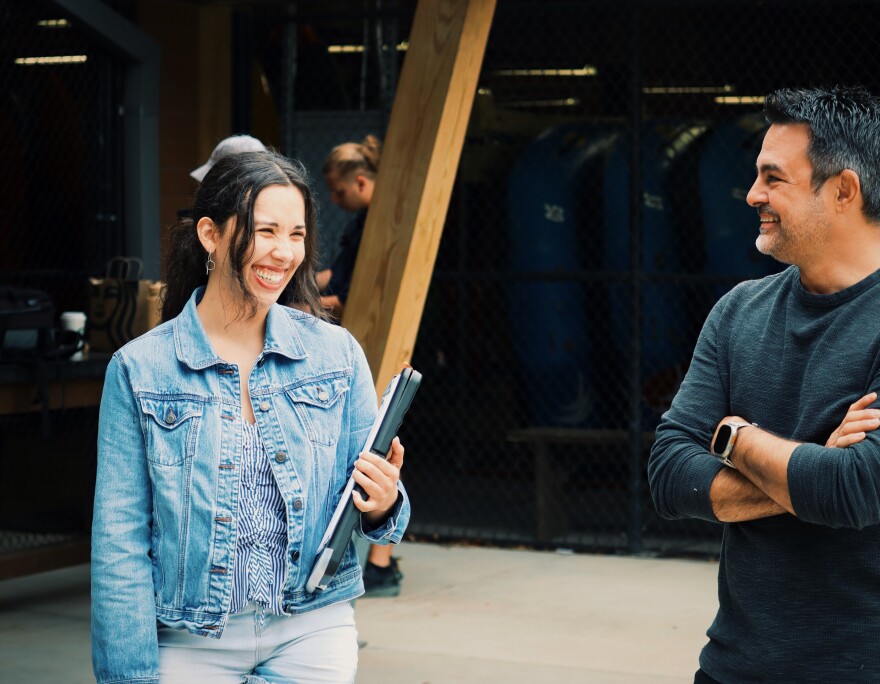This story first appeared as part of WFAE's EQUALibrium newsletter, exploring race and equity in the Charlotte region. Get the latest news and analysis in your inbox first by signing up here.
Over the coming weeks, tens of thousands of Venezuelans in the United States will take their first steps toward establishing the legal right to live and work in the U.S. — at least temporarily.
An estimated 472,000 Venezuelans last month became eligible for Temporary Protected Status, a humanitarian designation already held by 243,000 Venezuelans in the U.S. The program provides short-term relief to people who can’t return home due to natural disasters, armed conflict and other extreme situations. It’s a designation that currently applies to 16 nationalities and more than 600,000 people, including 17,000 in North Carolina. As Venezuelans flee economic and political turmoil in Latin America, they’ve quickly become the nation’s largest TPS community.
We reported last week about the relief felt by Venezuelans, like Cristian Espinoza, who could qualify for the program. He trekked from Peru, crossed the treacherous Darien Gap on foot and braved Mexico’s deadly train “La Bestia” to make it to North Carolina. Like many other Venezuelans we spoke to in the Charlotte community, he described TPS as a blessing and opportunity to build a better life.
TPS would give him the right to work in the U.S. and protect him from deportation, which is important as the Biden administration resumes removal flights to Venezuela. But the status for Venezuelans only runs through 2025, and it’s limited in what it can provide. Much like DACA holders, the so-called “Dreamers,” TPS holders have no pathway to permanent residency or citizenship. That can mean living in a “temporary” status for years or even decades, awaiting extensions — as many Salvadoran, Honduran and other TPS holders have learned.
Immigration attorney Cynthia Aziz spoke to me last year about earlier generations of Central American TPS holders. Many who fled civil war and violence in the ‘90s found textile, agricultural and construction work in North Carolina.
And after decades in the U.S., many of these temporary status holders are still in a kind of long-term limbo.
“They can't make the decisions that those of us that have full rights in this country can make,” Aziz said. “It's hard on them explaining this to their children. Why can't they freely travel? Why do they have to get permission for everything? Because that's what they've had to do for all these years – to get permission to work, get permission to drive.”
Paula Azuaje, a TPS holder from Venezuela, described the anxiety of living in this temporary space. When she left Venezuela nine years ago amid violent protests, she had to pause her film studies. Now, the recent Queens University graduate is making strides in the industry. She’s an associate producer at Mooresville-based Susie Films, and her first project as associate producer won a Southeast Emmy Award.
“I grew up in a different generation where just from a very, very young age, you feared a president and feared politics,” she said. “So I learned English on my own. Just so I could leave.”
She cried when she learned of Venezuela’s TPS extension in September. It meant another 18 months with the right to work and continue making films. But she’s scared of the extensions, and the options, running out.
“You get all these opportunities, and you get this new life where you feel safe most of the time. You have this freedom, but then you get to have anxiety all the time,” she said. “Eighteen months makes no sense to me. How do you expect a country to be fixed in 18 months? How do you expect people to have a stable life, just with 18 months?”
The National TPS Alliance and its local chapters have advocated for years for Congress to provide relief to longtime TPS holders, who have already established lives, families and businesses in the U.S.. National coordinator José Palma, a TPS holder from El Salvador, said the recent update to Venezuela’s program and others, like Afghanistan’s, was welcome news. But he said the government is capable of doing more to find solutions for the TPS community.
“As an organizer, I think it proves that if President Biden at this moment were willing to do something to support the immigrant community, and the undocumented population that is coming from countries that qualify for TPS, he can do it,” Palma said.
He would like to see a pathway to permanent residency for TPS holders who have spent decades in the U.S.
“We are giving the best years of our lives. We are not only contributing economically to the United States, but also socially with so many other things,” he said. “We feel that that should be enough to prove that TPS recipients should have an opportunity to apply for permanent residence.”




